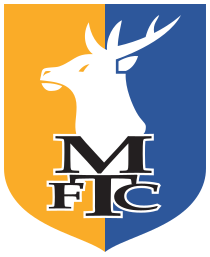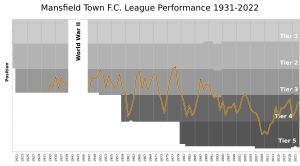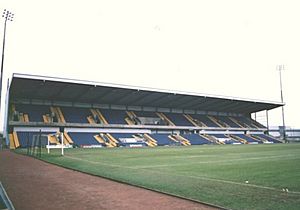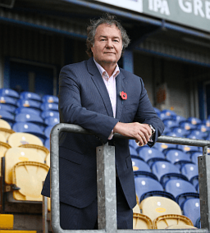Mansfield Town F.C. facts for kids
 |
||||
| Full name | Mansfield Town Football Club | |||
|---|---|---|---|---|
| Nickname(s) | The Stags | |||
| Founded | 1897 (as Mansfield Wesleyans) | |||
| Ground | One Call Stadium | |||
| Capacity | 9,186 | |||
| Owner | John Radford | |||
| Chief Executive | Carolyn Radford | |||
| Manager | Nigel Clough | |||
| League | League Two | |||
| 2018–19 | League Two, 4th of 24 | |||
|
||||
Mansfield Town Football Club is a professional association football team from Mansfield, Nottinghamshire, England. The team is often called 'The Stags'. They play in blue and yellow kits. Currently, they compete in League Two, which is the third level of English football.
The club started in 1897 as Mansfield Wesleyans. They joined local leagues and changed their name to Mansfield Wesley in 1906. Finally, in 1910, they became Mansfield Town. They moved between different leagues before joining the Midland League in 1921. They won this league three times before joining the main Football League in 1931.
Mansfield Town has moved up and down through different divisions over the years. They reached the Second Division for the first time in 1976–77 after winning the Third Division title. They also won the Associate Members' Cup in 1986–87. After a period outside the Football League, they returned in 2013. In the 2023–24 season, they were promoted from League Two.
Since 1919, Mansfield Town has played at One Call Stadium. This stadium is now an all-seater stadium and can hold 9,186 fans. Their main rivals are Chesterfield. They also play exciting local games against Notts County.
Contents
Club History: The Stags' Journey
How Mansfield Town Started
Mansfield Town was first formed in 1897. It was called Mansfield Wesleyans. The name came from a local church. For a few years, they played friendly games. In the 1902–03 season, they joined the Mansfield and District Amateur League.
In 1906, the league stopped being just for amateur teams. The church then stopped supporting the club. So, the team changed its name to Mansfield Wesley. They moved to a new league called the Notts and District League.
In 1910, the team changed its name again to Mansfield Town. They played in different local leagues. Then, World War I paused all football games. After the war, Mansfield Town started playing at the Field Mill ground. This happened because another local team couldn't pay their rent there.
In 1921, the club joined the Midland Counties League. They did very well, reaching the sixth round of the FA Cup twice in a row. They won the Midland League in 1923–24 and 1928–29. They even reached the fourth round of the FA Cup in 1928–29. They beat a big team, Wolverhampton Wanderers, but lost to Arsenal. Even with these successes, they couldn't get into the Football League right away.
Joining the Football League
In 1931, Mansfield Town finally joined the Third Division of the Football League. At first, they found it tough. They often finished near the bottom of the league. One bright spot before World War II was a player named Ted Harston. He scored an amazing 55 goals in one season! He later moved to Liverpool.
After the war, Mansfield Town started to improve. In the 1950–51 season, they reached the fifth round of the FA Cup. They also became the first Football League team to play 23 home games without losing. However, they just missed out on promotion that year.
On August 23, 1958, Lindy Delapenha became the first Black player for Mansfield. He was from Jamaica. He played 115 games for the club and scored 27 goals. In 1959–60, the club was moved down to the new Fourth Division. But they quickly earned promotion back to the Third Division in 1962–63.

A few seasons later, Mansfield had an exciting FA Cup run. They beat West Ham United 3–0 in the fifth round of the 1968–69 FA Cup. They then narrowly lost to Leicester City in the quarter-finals. In 1971–72, Mansfield was moved down to the Fourth Division again.
By 1976–77, the club was back in the Third Division. They won the Third Division title that year! However, they were moved down again soon after. In May 1987, Mansfield won the Football League Trophy in front of 58,000 fans. They beat Bristol City in a penalty shootout after a 1–1 draw.
The 21st Century and Recent Success
In 2001–02, Mansfield Town was promoted to the third tier of English football again. But they were moved down to League Two in 2003. In 2008, they lost their place in the Football League entirely. This meant they played in the Conference for five seasons.
In 2012–13, after new owner John Radford invested in the club, Mansfield Town won the Conference title. This meant they were promoted back into the Football League! This was a huge moment for the club. They sealed the title with a 1–0 win against Wrexham on April 20, 2013.
In the 2018–19 season, the Stags almost got promoted again. They lost in the play-off semi-finals. In 2021–22, they reached the play-offs once more but lost in the final. However, in the 2023–24 season, Mansfield Town achieved promotion to League One, finishing in 3rd place.
Who Owns Mansfield Town?
In 2006–07, a group called "SFFC (Stags Fans for Change)" was formed. They wanted the owner at the time, Keith Haslam, to leave the club. They even hired a plane to fly over a local derby game with a banner saying the club was for sale.
In March 2008, some businessmen who were also Mansfield Town fans bought the club. They were Andrew Perry, Andrew Saunders, and Steve Middleton. They bought the club from Keith Haslam, but they still had to rent the stadium from him.
At the start of the 2010–11 season, John Radford bought Mansfield Town. On December 2, 2010, the club was temporarily locked out of Field Mill because of a rent dispute. After sorting things out, John Radford worked to make sure the club would own Field Mill again.
On March 1, 2012, Chairman John Radford bought the ground from Keith Haslam. This was a very important day for the club! Now, March 1st is called "Amber Day" to celebrate Mansfield getting its stadium back. In April 2012, Radford changed the stadium's name from "Field Mill" to "One Call Stadium" for sponsorship reasons.
Mansfield Town's Rivals
Mansfield Town has some strong rivalries with other football clubs. Their biggest rivals are Chesterfield and Notts County. Games against Notts County are known as Nottinghamshire derbies. They also have a growing rivalry with Grimsby Town and Lincoln City.
Team Colours and Kits
When the club was Mansfield Wesleyans, they played in chocolate and sky blue shirts. When they became Mansfield Town in 1910, they wore red shirts, white shorts, and black socks for a short time.
After returning in 1919, Mansfield Town started using their well-known blue and amber colours. They have used these colours in many different designs over the years. Sometimes the shirts were half blue and half amber, or blue with amber sleeves.
From 1954 to 1961, they wore white shirts and black shorts. Then, amber shirts with blue shorts returned for seven years. Since 1974, the classic amber and blue colours have been the main ones. The only time they changed was for their 100th anniversary in 1997–98. For that season, they wore a special kit that looked like the original Mansfield Wesleyans' kit.
| Selection of Mansfield Town home kits through history | |||||||||||||||||
|---|---|---|---|---|---|---|---|---|---|---|---|---|---|---|---|---|---|
|
|
|
|
|
|
||||||||||||
Kit Suppliers and Sponsors
Football clubs often have companies that make their kits (shirts, shorts, socks) and companies that pay to have their names on the shirts. Here are some of the companies that have worked with Mansfield Town:
| Kit suppliers | ||
|---|---|---|
| Period | Supplier | |
| 1975–1976 | Umbro | |
| 1976–1977 | Bukta | |
| 1977–1983 | Umbro | |
| 1983–1986 | Lowfields | |
| 1986–1988 | 5D Togs | |
| 1988–1990 | Scoreline | |
| 1990–1992 | Ribero | |
| 1992–1993 | Hero | |
| 1993–1994 | Pelada | |
| 1994–1995 | Activity | |
| 1995–1996 | In-house production | |
| 1996–1998 | Beaver | |
| 1998–2000 | Russell Athletic | |
| 2000–2004 | In-house production | |
| 2004–2006 | Garman | |
| 2006–2008 | Carlotti | |
| 2008–2010 | Canterbury of New Zealand | |
| 2010–2013 | Erreà | |
| 2013–2023 | Surridge Sports | |
| 2023–present | Castore | |
| Front of shirt sponsors | |
|---|---|
| Period | Sponsor |
| 1983–1987 | Evinson's Ford |
| 1987–1991 | Mansfield Brewery (1987–1989: Marksman Lager; 1989–1990: Mansfield Beers; 1990–1991: Mansfield Bitter) |
| 1991–1992 | Gunthorpe Textiles |
| 1992–1993 | GTC |
| 1993–1995 | Abacus Lighting |
| 1995–1998 | Mansfield Brewery (Mansfield Bitter) |
| 1999 | AD-MAG |
| 2000–2001 | Thorworld |
| 2001–2003 | Vodka Kick |
| 2003–2007 | Perry Electrical |
| 2007–2009 | ASPL |
| 2009–2011 | Hymas Homes |
| 2011–2013 | Greene King IPA |
| 2013–present | One Call Insurance |
| Sleeve sponsors | |
|---|---|
| Period | Sponsor |
| 2023–2024 | Food Hub |
| 2024–2025 | Source Travel |
| 2025-Present | Relate Consultancies |
Meet the Players and Staff
Current Squad
Here are the players currently on the Mansfield Town team:
|
|
Players on Loan
These players are currently playing for other teams for a short time:
|
Under-21s Team
These are younger players who are part of the club's development squad:
|
|
Club Officials
These are the people who help run the club:
- Owner/Chairman: John Radford
- Chief Executive Officer: Carolyn Radford
- Financial Director: James Beachill
- Legal Director: Bill Broughton
- Director: Steve Hymas
- Director: Mark Burton
- Director: Paul Brown
- Director: Sid Pepper
- Club secretary: Diane Ceney
First Team Staff
These are the people who work directly with the first team players:
- Manager: Nigel Clough
- Assistant manager: Gary Crosby
- First team coach: Andy Garner
- Strength & conditioning coach: David Waldie
- Physio: Tom Whittamore
- Goalkeeper coach: Adam Collin
- Head of recruitment: Simon Clough
- Senior performance analyst: Matt Ash
- Academy manager: Richard Cooper
Club Records and Achievements
Team Records
- Biggest Win:
- 9–2 against Rotherham United on December 27, 1932 (at home)
- 9–2 against Harrogate Town on February 13, 2024 (at home)
- Biggest Loss:
- 8–1 against Walsall on January 19, 1933 (away)
Season Records
- Most Wins in a Season:
- 28 wins in 1974–75 and 1976–77 (when a win was 2 points)
- 30 wins in 2012–13 (when a win was 3 points)
- Fewest Losses in a Season:
- 6 losses in 1974–75
- 7 losses in 2011–12
- Most Goals Scored in a Season:
- 108 goals in 1962–63
- Fewest Goals Conceded in a Season:
- 38 goals in 1984–85
- Most Points in a Season:
- 68 points in 1974–75 (2 points per win)
- 95 points in 2012–13 (3 points per win)
Player Records
These records are for all official league and cup games:
- Most Appearances:
- Rod Arnold (1970–71, 1972–1984) played 522 games.
- Most Goals:
- Harry Johnson (1931–1936) scored 114 goals.
Cup Achievements
- Best FA Cup Performance: Quarter-finals in 1968–69
- Best FA Trophy Performance: Runners-up in 2010–11
- Best EFL Cup Performance: Quarter-finals in 1975–76
- Best EFL Trophy Performance: Winners in 1986–87
Club Honours: Trophies and Titles
Here are the major titles and achievements Mansfield Town has won:
League Titles
- Third Division (level 3)
- Champions: 1976–77
- Fourth Division / Third Division / League Two (level 4)
- Champions: 1974–75
- Promoted (3rd place): 1985–86, 1991–92, 2001–02, 2023–24
- Promoted (4th place): 1962–63
- Conference (level 5)
- Champions: 2012–13
- Midland League
- Champions: 1923–24, 1924–25, 1928–29
- Central Alliance
- Champions: 1919–20
Cup Titles
- Associate Members' Cup
- Winners: 1986–87
- FA Trophy
- Runners-up: 2010–11
See also
 In Spanish: Mansfield Town Football Club para niños
In Spanish: Mansfield Town Football Club para niños
 | George Robert Carruthers |
 | Patricia Bath |
 | Jan Ernst Matzeliger |
 | Alexander Miles |



